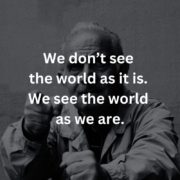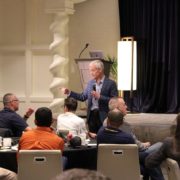The Gift Of Conflict
In preparation for a workshop with a group of executives on “Managing Conflict,” I developed the following “Five Steps To Managing Conflict:”
Step 1.
Understand the nature of conflict and its importance in our lives.
Three Premises About Conflict:
- Without conflict, you aren’t growing. We don’t grow without the challenges that emerge from conflict.
- Without conflict, you are stagnant. If everyone were the same, most people would be redundant. Diversity and the resulting conflict is necessary.
- Without conflict, life isn’t interesting. Have you ever seen a movie or read a novel without conflict?
… But we all need to get better at dealing with it constructively. We need to redefine how we think about it. Conflict is not “good” or “bad.” What makes it either constructive or destructive, is how it is dealt with.
Conflict is a gift – when you face it, work through it, and learn from it with the support from others.
Anger opens the door to conflict, as long as you keep it honest and respectful.
Anger: An honest and respectful dissatisfied emotional response to a person or situation with the intent to bring either resolution or protection.
Inappropriate expressions of anger
- Violence: The exertion of power with the intent to injure or abuse.
- Bullying: A discriminatory act of force or coercion with the intent to be superior, involving a perceived imbalance of power.
- Rage: Misdirected, dishonest, unbridled anger.
Because of their early exposure to some of these inappropriate uses of conflict, most people either withdraw from it or use it destructively. Either response will not help you use conflict productively.
Step 2.
Clarify Expectations and Accountabilities. Clearly defined expectations and accountabilities early on do a lot to prevent conflict, especially if you agree upon a process for talking about disagreements when you get off track – before you get off track.
Step 3.
Deal With Conflict Immediately – Before It Becomes Infected. I love Nelson Mandela’s definition of resentment: “Taking poison in the hopes that your enemy will die.” Talk about your disagreements up front, before they fester into something much worse.
Step 4.
Seek first to resolve the anger in the other, then between you. If you are in a disagreement with a person, clarify their interests and needs before focusing on your own interests and needs. Find common ground on interests, and stay away from positions. Communicate!
Step 5.
Reach for a shared meaning if there is respect and goodwill between you. Assuming there is respect and goodwill in a relationship, here’s my formula for reaching what I call a “shared meaning”:
- Person A speaks for self, using “I” statements. No blame. Personal responsibility for feelings and needs.
- Person B repeats back what they heard Person A say.
- Person A fills in any missing pieces.
- Person B repeats back what they heard Person A say until Person A says they feel understood.
- Person A then expresses a statement of need (expectation) from Person B. (“I need…”).
- Person B repeats back what they heard until Person A feels understood
- The process is then reversed, with Person B speaking for self, using “I” statements, etc.
In summary, conflict is a gift, but we need to develop the muscles of learning to embrace and resolve it effectively so as not to have it destroy us.









